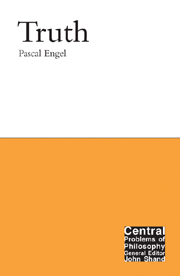2 - Deflationism
Summary
In this chapter, I shall discuss various views on truth that have been called deflationist. They reject the idea that truth can be defined as a “robust” or “substantive” metaphysical notion, and claim that truth is not a genuine property: it is a simple, formal or logical, device of assertion, which does not amount to much more than the truism that p and it is true that p are equivalent. In other words, we empty the right-hand side in our (Def T) schemas of any genuine content, to keep only their bare logico-linguistic form, which is just:
X is true iff X
where the only candidate for the other side of the equivalence is simply X itself. But then the equivalence becomes trivial: the righthand side does not tell us much, if anything. The upshot of such views is to deflate the notion of truth, to the effect that there is not much to say about it. But this simplicity, or this simple-mindedness, can, as we shall see, be deceptive.
Varieties of deflationism
Let us use the generic term deflationism to designate the family of views that can appropriately be placed under heading (2) in Figure 1 (p. 12). They all share two negative commitments. The first is that truth is not a genuine property or relation. The second is correlative: truth has no real essence or nature, and cannot be defined as such.
- Type
- Chapter
- Information
- Truth , pp. 41 - 64Publisher: Acumen PublishingPrint publication year: 2002



